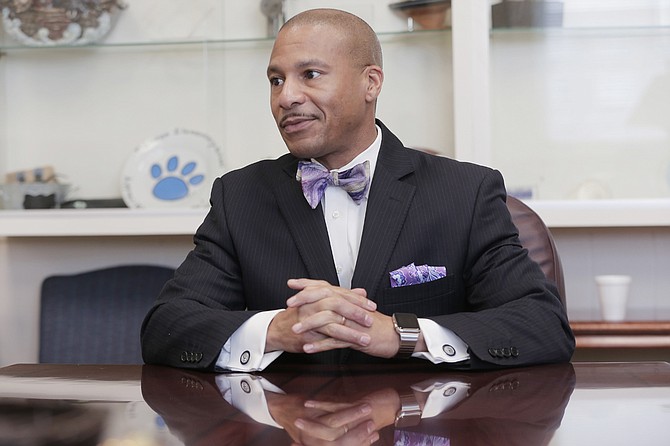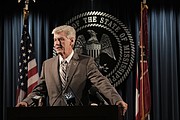Photo by Imani Khayyam.
The last year was a crazy one, to say the least, but crazy often means that intriguing people came out of the woodwork. Here are some of the local people we found the most intriguing over the last year, for better or worse.
Dr. Cedrick Gray
Armed with an inexhaustible supply of bowties and promises before his speeches that he wouldn't start preaching—but usually ending up preaching anyway—Dr. Cedrick Gray led the Jackson Public Schools district for four years before his dramatic resignation in November. His tenure in JPS wasn't unsuccessful; he entered the district while it was on probation and kept it afloat at its long-standing "D" rating. The district also housed nationally recognized schools and nursed a healthy handful of A- and B-rated schools.
But Gray, who is also a preacher in Madison, warned as early as November 2015 that things might look different for JPS the next school year. With changing standardized tests and steeper cut-off points for proficiency, or "passing scores," he predicted the district's downgraded accountability rating, which came true this past October; JPS is now an "F"-district despite its many successes.
Gray suddenly disappeared from the public eye amid calls for his resignation and rumors that the school board pressured him to quit. Despite JPS board President Beneta Burt saying she had no knowledge that Gray intended to resign, the board announced his departure on Oct. 28, and he submitted his official letter of resignation on Nov. 1. Dr. Freddrick Murray, former chief academic officer for high schools, now serves as interim superintendent. — Sierra Mannie
Rebecca Sibilia, CEO of EdBuild
EdBuild took Mississippi by surprise. The New Jersey-based nonprofit came onto the scene after Lt. Gov. Tate Reeves and House Speaker Philip Gunn announced they had entered into a contract with the group to help vet the Mississippi Adequate Education Program, or MAEP.
MAEP determines the state's share of funding for its public-school districts, and its funding is the subject of vigorous debate among lawmakers and education stakeholders. EdBuild itself received scrutiny statewide, especially from teachers, a few of whom spoke at the capitol in November and admonished legislators for the secretive way they admitted to working with the company.
Central to EdBuild is CEO Rebecca Sibilia. On the surface, she does not seem to have much in common politically with the GOP leaders who employed her; Sibilia's Twitter, at least, is staunchly anti-Trump.
But she told the Jackson Free Press that EdBuild's focus, when it came to Mississippi and the state's funding formula, was "to do their job." EdBuild champions a funding mechanism called "weighted student funding" that stacks funds atop the base cost to educate a student based on factors like whether they live in poverty or are learning English. — Sierra Mannie
Barber/ Campaign for Southern Equality v. Bryant Plaintiffs
The 2016 legislative session in Mississippi meant the introduction and passage of House Bill 1523, the infamous "Protecting Freedom of Conscience from Government Discrimination Act," a blatant and heavily protested clap-back to the U.S. Supreme Court legalizing same-sex marriage in 2015. If it weren't for several plaintiffs in two lawsuits joined together to challenge the bill's constitutionality, Mississippi would have what many advocacy groups recognize as the most overreaching anti-LGBT laws nationally.
The plaintiffs in the joined Barber v. Bryant and Campaign for Southern Equality v. Bryant lawsuits are Mississippians from different walks of life. Some own nonprofit organizations; others were influential in the Civil Rights Movement. Some work in churches as pastors; others are creatives. All of them believed HB 1523 endangered not just their well-being but the lives of all Mississippians.
"The State of Mississippi has erected a scheme of legal privileges exclusively for those who subscribe to 'sincerely held religious beliefs and moral convictions' that might lead them to discriminate against same-sex couples who marry or want to marry, unmarried people engaging in sexual relations, and transgender people," the Dec. 16 Barber plaintiff brief states.The court drama is just getting started, but for now, the U.S. District Court put the bill on pause before it went into affect. Attorney General Jim Hood refused to continue to defend the law, so Gov. Bryant called lawyers at the ultra-conservative legal group Alliance Defending Freedom to help him appeal the lower court's decision. — Arielle Dreher
Gov. Phil Bryant
Gov. Phil Bryant started his second term with a packed plate: a potential federal-foster care takeover, finalizing big economic-development projects and managing the state's budget. Bryant also managed to make 2016 a banner year for religious-freedom debates, education and Donald Trump.
The Heritage Foundation, a conservative think tank, awarded the governor with the Conservative Leadership Award after he signed House Bill 1523 into law, despite rallies of concerned Mississippians calling on him not to do so and various boycotts of the state. The Education Commission of the States, a Colorado-based education policy research center, named Bryant as chair-elect in December.
Bryant called two special sessions this year, one to ram through an economic-incentives package, which should eventually bring 3,500 jobs to the state from a Continental Tire factory in Hinds County and a shipyard in Gulfport. The State issued $274 million in bonds to make the two projects possible. Bryant called a second special session to plug budget holes in the fiscal-year 2016 budget, just days before it ended. He also helped secure funding for the new Mississippi Department of Child Protection Services, avoiding a federal takeover of the state's foster-care system. Bryant campaigned enthusiastically for Donald Trump, including at the coliseum during a rally with Trump and Brexit leader Nigel Farage, and plans to attend his inauguration this January. — Arielle Dreher
'New' Mississippi Supreme Court Justices
Four Mississippi Supreme Court justices will take the bench in the new year, and three of them are no stranger to the bench at all. District 1 Justice Jim Kitchens won a fairly close race in November, beating Court of Appeals Judge Kenny Griffis to re-claim his seat.
District 2 Justice Dawn Beam ran her first election campaign, after she was appointed to the state's high court in February to fill the unexpired term of Justice Randy Pierce. Beam won her election easily and has already started work on the state's foster-care system; she co-chairs the Commission on Children's Justice.
Justice James Maxwell was elected in an uncontested race back to his seat on the bench. Newly elected District 3 Justice Robert Chamberlin won a tough, contested race and a run-off election. He previously served for 12 years as a circuit court judge and was responsible for starting the 17th Circuit District's Drug Court in 2006. Chamberlin replaces Justice Ann Lamar, who retired in December. All four justices were sworn in to their roles on Jan. 3.
The Mississippi Supreme Court recently adopted new Mississippi Rules of Criminal Procedure that will go into affect in July 2017, with the goal of bringing uniformity and transparency to the criminal-justice procedures in the state. The court spent six years working on the rule changes. —Arielle Dreher
Rep. Debra Gibbs, D-Jackson
When former Rep. Kimberly Campbell, D-Jackson, announced she would not return to her post in the Mississippi Legislature, the seat for District 72 opened up for a special election. Debra Gibbs, a local attorney and former businesswoman, won the run-off election between her and Synarus Green, the director of policy and intergovernmental affairs for the City of Jackson, in September. She joins the often-vocal Jackson coalition of lawmakers in the House of Representatives for the 2017 session of the Mississippi Legislature this week.
Gibbs told the Jackson Free Press in her pre-election interview that if she won, she plans to use her relationships in the House in order to bolster bipartisan conversations. She said education and families are two of the major policy areas important to her as well as infrastructure and community safety. Gibbs previously worked as the commissioner of the Mississippi Workers' Compensation Commission and the director of accounting and finance at the Mississippi Department of Human Services back in the 1990s. — Arielle Dreher
Marshall Fisher
Two years after Gov. Phil Bryant appointed Marshall Fisher as the commissioner of the Mississippi Department of Corrections, Fisher still has a lot of work to do, he openly admits. He is also open to several criminal-justice reforms, made possible by House Bill 585, which the Legislature passed in 2014.
This year, MDOC closed Walnut Grove Correctional Facility, which was the subject of several lawsuits when the facility imprisoned minors. MDOC claimed the prison closed due to the state's decreasing prison population and tight budget. The State will continue to pay off its private-prison bonds until 2028 (including on Walnut Grove), which will cost the state $328.4 million.
Mississippi's prison population numbers have dropped since 2014, but not as dramatically as it first appeared. On Dec. 15, 2014, there were 19,204 inmates in MDOC's custody. By 2015, that number had dropped to 18,933, but 19,006 prisoners were in the state's custody as of Dec. 18, 2016. As the importance of alternatives to incarceration—especially for those needing mental-health care and nonviolent criminals—catches on in the state, Fisher is emerging as a leader for the changes, telling the House Corrections Committee the State is in dire need of re-entry resources and mental-health courts. The Legislature will have to fund alternatives and community corrections, however, so that expanding mental health, drug and re-entry courts statewide can become a reality. —Arielle Dreher
Carolyn Meyers
Dr. Carolyn Meyers, president of Jackson State University since 2011, resigned in November amid questions the Mississippi Institutions of Higher Learning, the governing body for the state's public universities, voiced concerning the declining financial health of Jackson State University under her tenure.
In October, the IHL Board of Trustees hired the accounting firm of Matthews, Cutrer and Lindsay to review JSU's financial health after reports of dwindling cash on hand. The university saw its reserve shrink from $37 million in 2012 all the way down to $4 million in 2016, per IHL estimates. At one point, JSU had enough cash on hand for about a week's operating budget.
IHL appointed Rod Paige, who served as George W. Bush's secretary of education, to serve as interim president until Meyers' replacement can be found. The goal is to find a permanent president by July 1, 2017, Paige said. — Tim Summers Jr.
Tyrone Hendrix
The current Jackson City Council president, Ward 6 Councilman Tyrone Hendrix, faces a quagmire of a year in 2017, with budget issues and infrastructure needs growing. In addition, he must help ensure transparency within the legislative branch of municipal government as the City deals with a number of lawsuits that have the potential to cost the city money it doesn't have.
One is the federal sexual harassment and discrimination federal lawsuit that Mayor Tony Yarber's former executive assistant, Kimberly Bracey, filed in 2016. A few weeks ago, the council placed a potential settlement on its agenda, only to have Hendrix himself pull the item out. Later, in an interview with the Jackson Free Press, Hendrix said he would make sure that the details of the settlement are released in compliance with the state's open-record laws. —Tim Summers Jr.
Robert Shuler Smith
The holiday trial of Hinds County District Attorney Robert Shuler Smith continued this week as the Mississippi attorney general's office tried to convince a Hinds County jury that Smith conspired to hinder the office's prosecution by aiding and assisting the defense of Christopher Butler.
Whether or not the jury is unknown at press time, but the testimony of former Assistant District Attorney Ivon Johnson, who turned FBI informant after admitting to receiving bribes for lowered bonds, alleges that Smith was aware of the bribe. Smith is in his third term as Hinds district attorney, and text messages he sent and secret recordings of conversations with him indicate that he often uses some colorful language when discussing his perceived enemies. He even called Patrick Beasley, assistant attorney general and former assistant district attorney who is also black, an "Uncle Tom" in a text message. — Tim Summers Jr.
Christopher Butler
The mysterious man at the center of the current legal struggle between Hinds County District Attorney Robert Shuler Smith and the attorney general's office is Christopher Butler. He is charged with possessing more than an ounce of drugs from a 2011 Mississippi Bureau of Narcotics bust and then separate January 2016 wire-fraud allegations, finally appeared in court. Facing what his lawyers say could be100 years behind bars, Butler chose to invoke his Fifth Amendment right to avoid incriminating himself, in case statements would hurt him at a future date.
Smith, through the arguments of his lawyer Jim Waide, has asserted repeatedly that the actions he took over the last year, the ones that resulted in his arrest in June, were all in the pursuit of justice for Butler. — Tim Summers Jr.
Robert "Two Sweet" Henderson
During DA Robert Smith's investigation and trial, an old name re-emerged that is often connected with controversy and powerful people. Robert Henderson, who is known both as a reverend and by his old street name, "Too Sweet," admitted to being the go-between of bribe proffers between men wanting their charges dropped and DA Smith and ADA Ivon Johnson.
Henderson, now 44, was close to former Mayor Frank Melton, visiting his home on the eve of the Wood Street Players trial in 2006 (alongside JFP reporters and DA Smith, then a defense attorney for one of the accused, even as Melton wanted them convicted) also present. Henderson later was at Melton's side at his federal trial daily in 2009. In 2011, Gov. Haley Barbour pardoned Henderson for previous felonies as he was leaving office. In his pardon request, he listed references including DA Smith and one of Christopher Butler's attorneys, Sanford Knott. He testified last week that Smith was aware of the bribes, which the DA denies. — Donna Ladd
Justin Ransburg
If you've been involved in Jackson's art community in the last few years, you've probably encountered Justin Ransburg, but he seemed to take the city's art world by storm in 2016.
In the summer of last year, he became one of the tenants at The Wonder Lab, where he has been a mainstay, whether he is taking part in events such as Fondren's First Thursday, or just hanging out and creating at the lab. At a recent FFT, he collaborated with fellow Jackson-area artists Eli Childers and Margaret Sullivan to create a mural at Brown's Fine Art Gallery.
At the "Damn the Man, Save the Offbeat" fundraising event in November 2016, guests watched as Ransburg live-painted a piece that featured the character Garnet from "Steven Universe" punching Gov. Phil Bryant in the face. The piece was among several that he showcased at Priced to Move, Vol. 7 in December.
Last year, the City of Jackson commissioned Ransburg to paint a traffic box in downtown, and Rainbow Co-Op commissioned him to paint a table at High Noon Cafe. He is also a finalist for this year's Best Visual Artist in Best of Jackson.
To see Ransburg's art and learn about upcoming exhibits, find him on Facebook or Instagram at @RansburgArt. — Amber Helsel
Johnnie McDaniels
The former Jackson prosecutor-turned-juvenile-justice-facility director Johnnie McDaniels inherited a facility laden with obligations to a federal judge to transform a jail for juveniles into a more humane and rehabilitative way station for youth.
Faced with numerous problems, including funding, McDaniels has said in interviews that he knows that juvenile justice has to embrace more facets of crime prevention in young people, including addressing the mental-health problems that could contribute to the behavior that might culminate in the beginning of a life of crime.
McDaniels, through allowing tours of his facility and openly discussing the problem of juvenile delinquency and crime, represents a change in the national and local attitude to the problem of juvenile crime.
He also openly admitted that the system failed 17-year-old Charles McDonald who a man killed near the detention center, believing he was trying to break into a car in Performance Oil's parking lot. The accused shooter, Wayne Mitchell Parish, was indicted and arrested last week for McDonald's murder. — Tim Summers Jr.
Vasti Jackson
Blues musician Vasti Jackson, a legend in the capital city, was a featured performer at the Grammy Museum Mississippi during its opening in March, and a performer when the National Blues Museum in St. Louis, Mo., held its grand opening a month later.
While Jackson continued making big strides in the latter half of the year (playing at Italy's Porretta Soul Festival in July and recording with Dr. John and Cyril Neville in August are prime examples), the achievement that received the most note near the end of 2016 was his sixth album, "The Soul of Jimmie Rodgers."
Released in May, the acoustic record features Jackson's reinterpretations of Rodgers' songs and scored a Grammy Award nomination for the best traditional blues album. "The Soul of Jimmie Rodgers" will be going up against local bluesman Bobby Rush's "Porcupine Meat," on which Jackson also served as the musical director and guitarist.
We won't know the winner until the 59th annual Grammy Awards air on Sunday, Feb. 12, but it's exciting to see a longtime favorite of Mississippi blues fans getting wider-spanning attention for his work. — Micah Smith

















Comments
Use the comment form below to begin a discussion about this content.
comments powered by Disqus